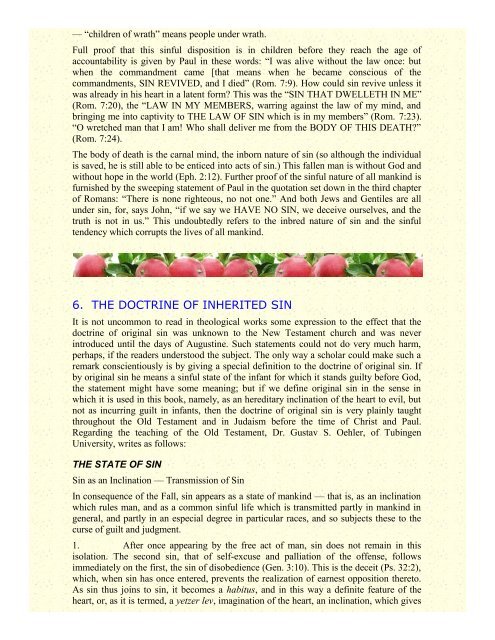2. The Meaning of Sanctification - Enter His Rest
2. The Meaning of Sanctification - Enter His Rest
2. The Meaning of Sanctification - Enter His Rest
Create successful ePaper yourself
Turn your PDF publications into a flip-book with our unique Google optimized e-Paper software.
— “children <strong>of</strong> wrath” means people under wrath.<br />
Full pro<strong>of</strong> that this sinful disposition is in children before they reach the age <strong>of</strong><br />
accountability is given by Paul in these words: “I was alive without the law once: but<br />
when the commandment came [that means when he became conscious <strong>of</strong> the<br />
commandments, SIN REVIVED, and I died” (Rom. 7:9). How could sin revive unless it<br />
was already in his heart in a latent form? This was the “SIN THAT DWELLETH IN ME”<br />
(Rom. 7:20), the “LAW IN MY MEMBERS, warring against the law <strong>of</strong> my mind, and<br />
bringing me into captivity to THE LAW OF SIN which is in my members” (Rom. 7:23).<br />
“O wretched man that I am! Who shall deliver me from the BODY OF THIS DEATH?”<br />
(Rom. 7:24).<br />
<strong>The</strong> body <strong>of</strong> death is the carnal mind, the inborn nature <strong>of</strong> sin (so although the individual<br />
is saved, he is still able to be enticed into acts <strong>of</strong> sin.) This fallen man is without God and<br />
without hope in the world (Eph. 2:12). Further pro<strong>of</strong> <strong>of</strong> the sinful nature <strong>of</strong> all mankind is<br />
furnished by the sweeping statement <strong>of</strong> Paul in the quotation set down in the third chapter<br />
<strong>of</strong> Romans: “<strong>The</strong>re is none righteous, no not one.” And both Jews and Gentiles are all<br />
under sin, for, says John, “if we say we HAVE NO SIN, we deceive ourselves, and the<br />
truth is not in us.” This undoubtedly refers to the inbred nature <strong>of</strong> sin and the sinful<br />
tendency which corrupts the lives <strong>of</strong> all mankind.<br />
6. THE DOCTRINE OF INHERITED SIN<br />
It is not uncommon to read in theological works some expression to the effect that the<br />
doctrine <strong>of</strong> original sin was unknown to the New Testament church and was never<br />
introduced until the days <strong>of</strong> Augustine. Such statements could not do very much harm,<br />
perhaps, if the readers understood the subject. <strong>The</strong> only way a scholar could make such a<br />
remark conscientiously is by giving a special definition to the doctrine <strong>of</strong> original sin. If<br />
by original sin he means a sinful state <strong>of</strong> the infant for which it stands guilty before God,<br />
the statement might have some meaning; but if we define original sin in the sense in<br />
which it is used in this book, namely, as an hereditary inclination <strong>of</strong> the heart to evil, but<br />
not as incurring guilt in infants, then the doctrine <strong>of</strong> original sin is very plainly taught<br />
throughout the Old Testament and in Judaism before the time <strong>of</strong> Christ and Paul.<br />
Regarding the teaching <strong>of</strong> the Old Testament, Dr. Gustav S. Oehler, <strong>of</strong> Tubingen<br />
University, writes as follows:<br />
THE STATE OF SIN<br />
Sin as an Inclination — Transmission <strong>of</strong> Sin<br />
In consequence <strong>of</strong> the Fall, sin appears as a state <strong>of</strong> mankind — that is, as an inclination<br />
which rules man, and as a common sinful life which is transmitted partly in mankind in<br />
general, and partly in an especial degree in particular races, and so subjects these to the<br />
curse <strong>of</strong> guilt and judgment.<br />
1. After once appearing by the free act <strong>of</strong> man, sin does not remain in this<br />
isolation. <strong>The</strong> second sin, that <strong>of</strong> self-excuse and palliation <strong>of</strong> the <strong>of</strong>fense, follows<br />
immediately on the first, the sin <strong>of</strong> disobedience (Gen. 3:10). This is the deceit (Ps. 32:2),<br />
which, when sin has once entered, prevents the realization <strong>of</strong> earnest opposition thereto.<br />
As sin thus joins to sin, it becomes a habitus, and in this way a definite feature <strong>of</strong> the<br />
heart, or, as it is termed, a yetzer lev, imagination <strong>of</strong> the heart, an inclination, which gives









